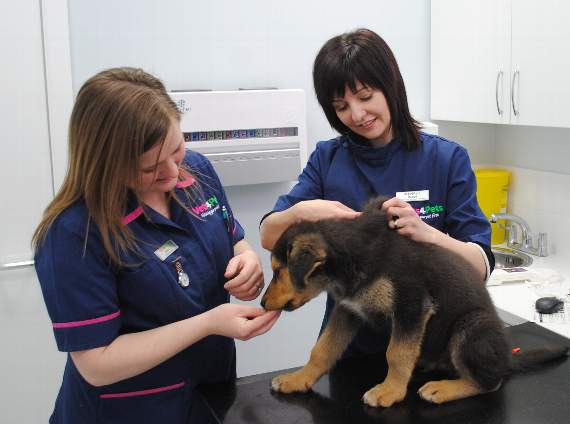AS of today, it is now illegal not to have your dog microchipped.
The new law requiring all dogs to be microchipped came into force on Wednesday, April 6, and owners without microchipped dogs now face a £500 fine.
Pets At Home estimate one in ten dogs, or 14 per cent, are currently not microchipped, with £580 million worth of fines at stake.
The legislation affects all dogs aged eight weeks and older in England, Wales and Scotland – Northern Ireland introduced a similar law in 2012.
Recent figures suggest 1.16m dogs still aren’t microchipped, despite a 70 per cent increase in the number pets being microchipped in the last month.
‘Any dog owner with an un-microchipped pet now faces a significant fine, but it is our advice to avoid this completely and comply with the law,’ said Dr Huw Stacey, director of clinical services at Vets4Pets.
‘Inserting a microchip is an easy and simple procedure, and is nothing for the owner or pet to worry about. It’s only about the size of a grain of rice.
‘Every microchip has a unique 15-digit code to identify the dog’s owner and is designed to last the lifetime of the pet.
‘The details are stored on one of seven microchip databases and are accessible to relevant professionals, including vets, dog wardens and the police.
‘The importance of a microchip shouldn’t be underestimated. It can be the difference between a lost dog being returned to their owner or simply being lost forever.
‘Reuniting dogs with their rightful owner is just one of a number of reasons why the microchipping law has been introduced.
‘It is also designed to encourage responsible dog ownership.’
Petlog, the UK’s largest lost and found database for microchipped pets, which is managed by the Kennel Club, found that more than 60,000 dogs were reported missing over a ten year period and 75 per cent of dogs were reunited thanks to their microchip.
But pets will only be reunited with their owners if they keep their contact details up-to-date, as Caroline Kisko, Kennel Club Secretary explains.
‘Pet owners need to treat their pet’s microchip information with the utmost importance,’ said Caroline. ‘If the contact details are not updated, the task of returning a pet to its owner becomes almost impossible.
‘Moving house, changing a mobile number or changing an email address are commons ways a lost pet can lose permanent contact with its owner.’
Local authorities and welfare charities spend around £57 million per year on kennelling costs, but more than 50 per cent of stray dogs cannot be returned because their owners cannot be identified.
Sadly this means approximately 6,000 dogs are put down each year because their owner cannot be found.
Figures from Northern Ireland suggest microchipping has had a positive impact, since being introduced four years ago, with the number of stray dogs being reduced.
‘The number of lost or stray dogs has reduced gradually since 2012, providing evidence that the microchipping law is working,’ added Dr Stacey. ‘Although it’s not compulsory, owners of cats and rabbits are strongly advised to also microchip their pet.
‘But right now it’s dog owners that need to comply with the law and we would urge anyone who is unsure if their pet is microchipped to visit their local vets to check.’



